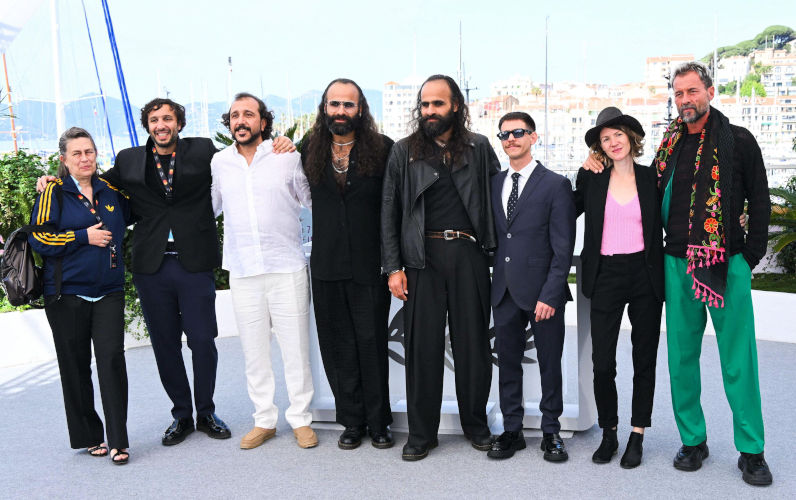Palestinian genocide gets some big-screen time
June 9, 2025
Films and the internet are proving to be a valuable way for the message of the Palestinian struggle to be publicised.
When twin Palestinian filmmakers Arab and Tarzan Nasser won the best director prize at Cannes in the Un Certain Régard section for their film Once Upon a Time in Gaza, they dedicated the award to the people of Gaza, stating, “To every single Palestinian, your lives matter and your voice matters, and soon Palestine will be free”. This was met with a standing ovation.
This reminds us that amid all the appalling complicity of mainstream media and arts administrators in the genocide in Gaza, the courageous and clear-sighted work of filmmakers stands out.
As much as any body of Westerners can be credited with exposing the Israeli-Western descent into barbarism in Palestine, it is filmmakers. Many of them have even received recognition from their peers. The Cannes prize was not alone. No Other Land, which won an Academy Award, comes immediately to mind. So too does the critically acclaimed The Settlers documenting the crimes of the Israeli colonisers on the West Bank.
If the teach-in was the way a generation learnt the facts of the Vietnam War back in the 1960s, film and the internet now help serve that role.
Among this clutch of revelatory films is the Australian-made Palestinians Don’t Need Sidewalks. The film follows the journey through the West Bank of a trio of Australians: young campaigner Rand Darwish, retired philosophy professor Peter Sleazak (whose parents were Holocaust survivors) and former Greens senator, Lee Rhiannon.
See a trailer for the film here:
Vimeo
They are accompanied on their journey by Emad Abu Shamseih and other members of the Hebron-based Human Rights Defenders, who contribute not only local knowledge but film footage of the atrocities — including murder — committed on the streets of the West Bank by Israeli troops and settlers. “We consider the camera to be part of the resistance to the occupation,” says Emad Abu Shamseih.
The film is roughly divided into three chapters; Genocide, Resistance and (once the three have returned too Australia) Complicity. The film is both a thorough lesson in the modern history of Palestine — the archival footage certainly gives it immediacy — as well as a contemporary snapshot of life and resistance for Palestinians in the West Bank and in the refugee “camps” in Lebanon. The film makes clear the logical progression of Zionist ideology, the Nakba of 1948, the successive waves of violence and dispossession since, and now the stepped-up genocide and ethnic cleansing.
Amid all the big picture stuff are small and intimate moments. None so much as Rand and her Jewish Australian friend Yaacov making tabouleh together and then sharing a Shabbat meal with a large and friendly group of their anti-Zionist comrades. The predominance of women in that gathering — and in the crowd protesting the Land Forces arms fair in Melbourne — is another confirmation of the predominance of women in emancipatory and left-of-centre politics in our times.
Palestinians Don’t Need Sidewalks was co-directed by Jill Hickson and John Reynolds. Bashir Sawalha is a co-producer and fellow-filmmakers Mandy King and Fabio Cavadini contributed footage. Mary Kostakidis provides the narration. Noteworthy among the funders of the film are branches of the Maritime Union of Australia.
Throughout the film, Randa Abdel-Fattah provides a devastating and eloquent commentary on recent Palestinian resistance and Israeli crimes. The film is worth watching just for this. It is true that the Zionist diaspora is very influential in keeping governments, corporations and the media in line, but as Abdel-Fattah points out, this ideological offensive goes beyond just Zionism. Both sides of mainstream politics, for instace, are committed to developing Australia’s armaments industry – big time. And Gaza is just the latest of the “Killing Zones” that armaments companies need to test out their weapons and generate their super profits.
The afore-mentioned No Other Land and The Settlers have had some exposure in the mainstream. Other films, such as The Encampments, about the surge of solidarity and its repression at Columbia University in the United States, have not been so fortunate. The Encampments could only be shown in New York under the armed presence of security guards after the venue was trashed, accoding to a recent Guardian report. It is not uncommon for films like this to be pulled from cinemas because of threats and boycotts.
Typically, Palestinians Don’t Need Sidewalks, despite its high production values, topicality and evocative footage, has evoked no interest from our public or commercial broadcasters. No surprises there. But it is being “four-walled” — shown in hired community venues — around the country. (Hence the headline.) The screenings are organised by community groups in the suburbs and country towns – part of the extraordinary and virtually unreported solidarity movement in this country.
As for the idiosyncratic title of this film, I won’t give any explanation. It’s another reason to see the film.
For hiring details of Palestinians Don’t Need Sidewalks, contact:
Lee Rhiannon 0400 350 0676. lee.rhiannon@gmail.com or
John Reynolds - 0404 100 903 johnreynolds1917@gmail.com
The views expressed in this article may or may not reflect those of Pearls and Irritations.

